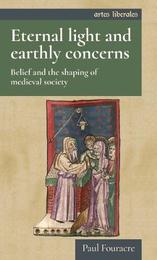
|
Eternal Light and Earthly Concerns: Belief and the Shaping of Medieval Society
Hardback
Main Details
| Title |
Eternal Light and Earthly Concerns: Belief and the Shaping of Medieval Society
|
| Authors and Contributors |
By (author) Paul Fouracre
|
| Series | Artes Liberales |
|---|
| Physical Properties |
| Format:Hardback | | Pages:248 | | Dimensions(mm): Height 216,Width 138 |
|
| Category/Genre | Medieval European archaeology
Religion and beliefs
History of religion |
|---|
| ISBN/Barcode |
9781784993016
|
| Classifications | Dewey:270.3 |
|---|
| Audience | |
|---|
| Illustrations |
4 Maps
|
|
Publishing Details |
| Publisher |
Manchester University Press
|
| Imprint |
Manchester University Press
|
| Publication Date |
13 April 2021 |
| Publication Country |
United Kingdom
|
Description
This book investigates how the practice of keeping a light burning in churches was established in the early Middle Ages. It asks what the material consequences of implementing the practice were and why it ceased at the end of the Middle Ages. In early Christianity it was established that every church should have a light burning on the altar at all times. In this unique study, Eternal light and earthly concerns, looks at the material and social consequences of maintaining these 'eternal' lights. It investigates how the cost of lighting was met across western Europe throughout the whole of the Middle Ages, revealing the social organisation that was built up around maintaining the lights in the belief that burning them reduced the time spent in Purgatory. When that belief collapsed in the Reformation the eternal lights were summarily extinguished. The history of the lights thus offers not only a new account of change in medieval Europe, but also a sustained examination of the relationship between materiality and belief.
Author Biography
Paul Fouracre is Professor Emeritus of Medieval History at the University of Manchester -- .
Reviews'[A] meticulously documented survey'. The Journal of Religious History 'Paul Fouracre's new book is a breath of fresh air. It is a rare historical study that details the "material consequences of belief" in medieval Europe, combining cultural and religious history with a study of medieval economy, agrarian production and trade, and social organisation... To read Fouracre is to witness a master medievalist at work'. English Historical Review '[for] an intellectual historian, this book's most valuable contribution is that it inspires us to consider the material consequences of the ideas we study, just as it asks economic historians to attend to how ideas and culture may affect production and exchange. Fouracre's investigation provides a good example of both the potential and the limitations of such an undertaking and provides methodological models. As such, it should be read by everyone interested in the interplay of ideas and social and economic realities.' Speculum: A Journal of Medieval Studies volume 98, number 1 -- .
|